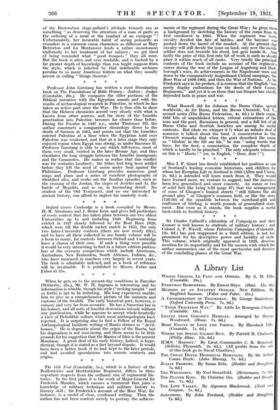Miss I. F. Grant has firmly established her position as
one of Scotland's leading economic historians, and children for whom her Everyday Life in Scotland to 1603 (Allen and Unwin, 2s. 6d.) is intended will learn much from it. They would have learned more, we venture to-suggest, had the narrative been less generalized and more concrete. An ounce or two of solid fact like being told (page 67) that the arrangement of some of Glasgow's busiest streets " still follows the old ground plan " of Glasgow's common field, or like the story (126-30) of the squabble between the merchant-gild and craftsmen of Stirling, is worth pounds of generalized state- ment. But even as it stands, the book supplies a useful back-cloth to Scottish history.
* 5 * 5


































 Previous page
Previous page